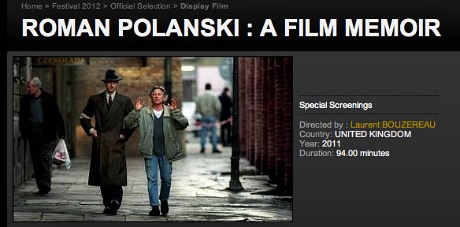Laurent Bouzereau and Andrew Braunsberg‘s Roman Polanski: A Film Memoir screened late this afternoon, and I don’t care what anybody says — this guy has gone through so much trauma and horror in his life, it’s a wonder he hasn’t put a bullet in his head or become some kind of alcoholic or drug addict. But that’s Polanski for you — feisty, resilient, a glass-half-fuller.

This is the first of two 2012 Polanski docs with Marina Zenovich‘s followup (or sequel) to Roman Polanski: Wanted and Desired set to play the fall festival circuit.
Bouzereau has the “directed by” credit, but the film wouldn’t have happened if Polanski hadn’t agreed to sit down with Braunsberg, an old friend and producing partner, so let’s split the authorship.
The doc, handsome and smooth as silk and well-edited by Jeff Pickett and movingly scored by Alexandre Desplat, is just talk — two-camera coverage of Braunberg talking to Polanski about his life intercut with clips, news footage, stills and whatnot. That’s all it is. But it seeps in and packs a punch, especially during the first 45 minutes or so. You’d have to made of stone not to be affected by Polanski’s recollections of his childhood years under Nazi terror in Poland.
The film was shot in two stages at his home in Gstaad — the bulk of it during Polanski’s house arrest after being imprisoned in Switzerland in 2009, and a kind of epiloque or end coda shot after Polanski was totally freed by Swiss authorities.
Roman Polanski: A Film Memoir is friendly, of course, so it’s not impartial and tough or Mike Wallace-y in the slightest. Polanski pitch-forkers will dismiss it, I expect, as too much of a blowjob. But it tells the truth start to finish, and the emotion that Polanski tries to hide when he talks about his mother, who was killed in a Nazi concentration camp, is obviously unassailable. The theme, finally, is about “never say die.” Even his detractors have to admit that Polanski is one tough bird.
